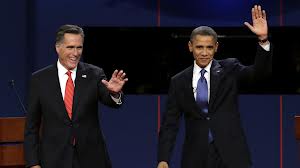Who in Washington Will Opt for the US- First Approach and Abandon the “Israel”-First Approach

Ali Rizk
On the eve of every US presidential election people throughout the world and especially in the Middle East would ask about the differences between candidates and whether or not a change in the White House would bring about genuine change in US policy.
In the Middle East this question revolves around the staunch US support for "Israel" and if there was any chance that a new face might make some adjustments to this policy. But the people of the region have long given up hope with the continuity of the "Israeli"-first approach coming from Washington despite the changes in faces.
But the people of the region have long given up hope with the continuity of the "Israeli"-first approach coming from Washington despite the changes in faces.
This loss of hope reached its peak with the Obama administration , with many initially believing that "Barack Hussein Obama" would be the one who would reevaluate Washington's middle eastern policy, particularly given the fact that Obama's father was a Muslim (as noted above), in addition to his upbringing in Muslim countries like Indonesia and his knowledge of the region and the Arab-"Israeli" conflict through former Palestinian colleges like the renown Palestinian scholar at Columbia University Rashid Khaledi, who was one of Obama's close friends in Chicago.
The continuity of the pro-"Israeli" policy during Obama's first term in office has left the people of the region convinced now more than ever before that US Middle Eastern policy will remain a constant regardless of who wins the presidency.
Taking this into account, now, just one month away from US Election Day, November 6, the race to the White House isn't exactly the first thing on people's minds in the Middle East. There is a general conviction that things won't change whether Obama is re-elected or Republican Party candidate Mitt Romney makes his way to the White House.
But it is important to note that Washington is in a period of decline whether it be on the global political arena or the state of its economy. Prominent voices in the US have said that never has Washington witnessed such a period of decline since world war two and that this period does in fact signal the end of US hegemony and the emergence of new players in the newly formed multi-polar world.
These voices (which include people like former National security advisors Zbigniew Bregenski and Brent Snowcroft) have called for changes to US policy which are now believed to be indispensable for Washington's interests.
And nowhere is the call for change more compelling than in the Middle East. The revolutions in the Arab world serve as a wakeup call for Washington to alter its "Israeli"-first policy and instead opt for a US-first policy as the former will be catastrophic for US interests in a region where the newly empowered people have a bigger say in policy making and consider "Israel" as the staunch enemy and the oppressor of the Palestinian brothers. So an interesting question arises:
Who in Washington will be more of a realist and take the bold steps which are essential for US interests? Will it be Barack Obama or Mitt Romney?
If indeed any one of the two is going to go in this direction, it will be the incumbent president Barack Obama for a number of reasons.
1- While Obama has proven to be politically timid against AIPAC and the congressional pro-"Israeli" hawks, if he gets re-elected he will be in his second term and have more of free hand to fend off pressure from special interest groups like the "Israeli" lobby.
2- Obama himself has identified with the realist school of thought as opposed to the ideologues and is hence more prone to pursue a realist agenda. His realist identity actually surfaced in the ongoing quarrel and disagreement with "Israeli" premier Benjamin Netanyahu over how to deal with Iran. When faced with an issue that was so crucial to US interests Obama actually chose not to surrender to Netanyahu.
3- Obama's rival Mitt Romney, if elected will be a first term president and all the more prone to the pressures of special interest groups and also donors.
4- And speaking of donors, Romney's biggest donor is Sheldon Adelson, the worldwide Jewish casino owner who is a strong supporter of Netanyahu and the owner of the pro-Likud "Israeli" Hayom newspaper Romney if elected will need to take this factor into account especially as he would need these donations for his re-election for a second term and hence here we have an obstacle for pursuing the US first approach rather than the "Israel" first approach.
5- A large segment of the Republican Party electorate is White evangelical Christians who are known their strong ideological support for "Israel". According to recent polls between 75 and 80% of evangelicals will vote Republican in the upcoming elections.
All this being said, Obama dared challenge Netanyahu on the issue of Iran only because the costs to US interests are so abundantly clear, and hence he had the backing of the majority of US citizens who are against war with Iran and are in general "war weary" as a result of the "unnecessary wars" launched by former President George W. Bush. On other issues where there are also costs to US interests but where these costs are not so abundantly clear, like the Palestinian-"Israeli" issue and pursuing a more even handed approach between the Arabs and "Israelis", Obama has backed down. (Obama was not even willing to exert more pressure on Netanyahu to freeze settlement construction).
So while Obama is the more likely to make adjustments , judging by his first term this would require the costs to US interests to become abundantly clear.(like in the Iranian scenario).These costs have become to appear and are becoming more apparent with the Arab revolutions. However in order to speed up this process some Arab countries in the Gulf who possess vast resources must use their leverage to pressure Washington into abandoning its "Israel" first approach instead of using this leverage to intensify the confrontation with other regional countries.
Source: moqawama.org




